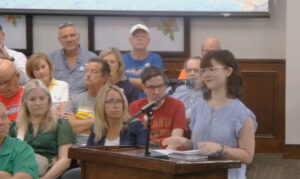Hike the same for homeowners, businesses, schools and churches
Peachtree City residents’ stormwater fees are set to increase drastically under a proposal that will be considered by the city council Thursday night.
Most city homeowners’ annual bills would go up between $44 a year and $99 a year, depending on the amount of impervious surface on the property. The city groups homeowners into four tiers for billing purposes. Those in Tier I will see their bill rise from $32.28 to $76.68; Tier II rises from $47.40 to $112.69 and Tier III would rise from $72 to $171.24 a year. The fourth tier, for attached residential (AR) would rise from $22.20 to $52.68 a year.
That is an across the board increase of 137 percent in all residential stormwater bills.
These increases also incorporate a surcharge to each bill for the impervious streets in the city, a $300,000 amount that previously came from the city’s general fund, according to city staff.
The rate increases would also affect stormwater bills issued to businesses, schools and churches, none of which are exempt from the city’s stormwater utility.
According to city staff, the bill increases are necessary to pay for $7.4 million in additional repair projects, all of which would be financed through a bond issue that would also refinance the 2006 stormwater bond for a total debt of $10.5 million.
Because of the proposed rate increase, city staff is proposing to change the billing system to twice a year instead of the current once a year bill issued to residential property owners.
The city’s stormwater program is designed to prevent pipe and road collapse, flooding and also drinking water contamination, and it has to meet a federal mandate to provide these services, including water quality monitoring of stormwater, city officials have said.
Among the major project estimates expected to be handled with the $7.4 million bond issue are:
• $1.5 million to line stormwater pipes that run beneath city streets and roads, along with other miscellaneous projects;
• $1.8 million to replace the drain system in the Harbor Loop area;
• $1.3 million to replace the drain system in the Golfview Drive area;
• $1.2 million to rehabilitate the two Kedron ponds;
• $911,000 for rehabilitation of the Rockspray pond;
• $450,000 for pipe lining in the area of Woodsdale and Lenox Road; and
• $120,000 for repairs to the stilling basin at the BCS Pond.
The city also maintains a crew of stormwater employees to handle routine maintenance such as cleaning out blocked drain pipes and sweeping debris from city streets. The city also has inspected its entire stormwater drainage system, which is aided by a number of ponds and lakes that impound water to be let out over a length of time into streams.
The problem, as seen in the project to improve Huddleston Pond, is that when the infrastructure deteriorates, it has to be repaired. In the case of Huddleston Pond, the fear was the earthen dam would fail, so the city had to drain the pond until the repairs could be completed. The final cost was $456,000 which was paid for with stormwater revenue.
Stormwater projects to not tend to be inexpensive. The city paid $175,000 on an assessment of the stormwater system and spent about $270,000 for new floodplain mapping. The city also spent $164,000 to remove a home in the Fairfield subdivision that flooded habitually. It was replaced with a regional detention pond at a final cost of $164,000.
Residents do have opportunities to reduce their stormwater bills by earning “credits” for litter removal activities such as the city’s Adopt-A-Mile or Adopt-A-Path programs. The city also will consider adding a 10 percent bill credit for homes which use rain barrels to prevent stormwater from running off the roof of their home.
Although the city could conceivably delay the bond issue, the main concern is that interest rates could increase and thus cost more to the city later, according to city spokesperson Betsy Tyler in a column on Page A5. There are also concerns that older pipes may fail, requiring emergency replacement and repairs, Tyler noted.
Currently, the city has about $750,000 remaining for capital projects from its 2006 stormwater bond. Regarding that 2006 bond, Tyler noted that when it was issued, the city knew of at least $9 million in needed drainage repairs, yet the total bond issue at that time was just $3.6 million. The lower figure was based on a theory that since the city could not complete all the projects at once, it made no sense to pay interest on money that could not be used, Tyler explained.
The city has $2.6 million outstanding on that bond issue, an amount that would be wrapped up into the $10.5 million bond as proposed by city staff for an estimated savings of more than $200,000 a year.










Leave a Comment
You must be logged in to post a comment.